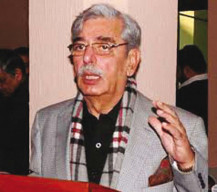
A friend of the author for twenty years, Riaz looked entirely at home speaking about him, including anecdotes and praise for his work and for “not just becoming another Salmaan Rushdie type” because of Hussein’s resistance to “saying things that would make him popular.”
Praising his work in Urdu, the poetess said that she had told Hussein that writing in the language would “unlock” something in his mind.
Fatima Hassan read excerpts from Hussein’s story “Maya aur Hans” from an upcoming collection by the same name - an engaging and simplistic story about relationships and separation - which Riaz also said was one of her favourites. Hassan opined that the story highlighted Hussein’s grasp of Urdu, saying “you can’t even tell it’s by an English writer”.
Hussein said the story took him two days to write, but “three weeks to type because I wrote it by hand.”
“When I started writing in Urdu - in Roman script - the first thing I wrote about was London. I sent it to Fatima and Asif Farrukhi and asked them if I could do this, and they said yes, and Asif said send me five stories like this.”
Hussein, making the transition to being a bilingual author, said he thinks in Urdu but is driven by voices and what he hears.

The questions from the audience were primarily on this transition, and how Hussein derived context for Pakistan. “The sound and syntax of the [English and Urdu] language is different so it comes to you differently. The context often came from migrant experiences,” he said in response to a question on whether he approaches writing differently depending on the language.
He also read one of his older stories, The Book of Maryam, at the event.
And while the questions at the event were few and often repetitive, Riaz and Hassan filled the blanks with their commentary on Hussein’s work. Later, fans questioned him on his use of dreams, fables and magical realism.
An audience member questioned him over the relationship between literature and religion, noting that his books never made a religious leaning clear. Hussein said that as a fan of Rumi, he could not disassociate himself from spirituality. ‘I don’t write statements in my fiction. If I wanted to write facts, I would be a historian and if I wanted to write political propaganda, I’d be a journalist,” he replied when asked about his stance on colonialism, though he noted that his work was a rejection of colonialism.
Hussein, when asked about his future plans, said that he does not see an Urdu book authored by him on the cards.
Published in The Express Tribune, December 13th, 2012.
1719315628-0/BeFunky-collage-(8)1719315628-0-405x300.webp)


1731329418-0/BeFunky-collage-(39)1731329418-0-165x106.webp)

1731826589-0/Untitled-design-(14)1731826589-0-270x192.webp)

1731749026-0/Copy-of-Untitled-(3)1731749026-0-270x192.webp)









COMMENTS
Comments are moderated and generally will be posted if they are on-topic and not abusive.
For more information, please see our Comments FAQ